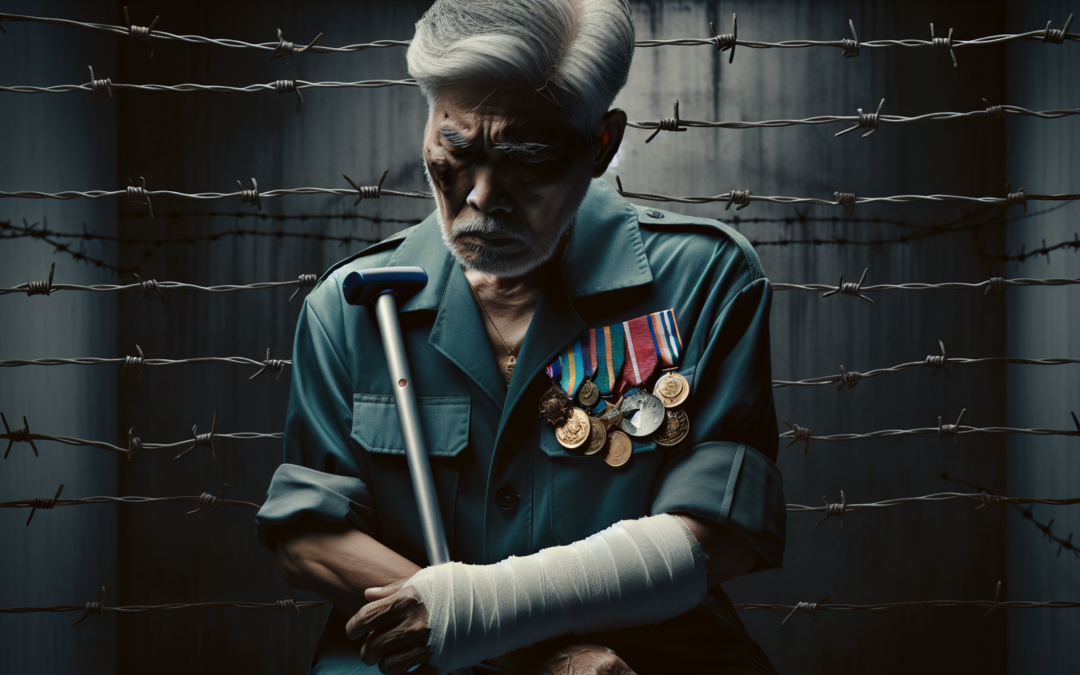A Disturbing Injustice: Honorable Veteran Faces Prolonged Imprisonment Amid Unmet Needs and Neglected Wounds
As citizens living in the land of the free, we often overlook the cost at which this liberty is granted. Those costs are paid not only in careers lost or disrupted, but also in physical and emotional scars carried by our brothers and sisters who serve in the armed forces. In today’s episode of The John Ligato Show, we meet “The Angry Vet,” a man who saga reveals an uncomfortable truth about how our justice system—especially law enforcement—sometimes misfires, leaving honorable lives in its wake.
For our law enforcement officers, the mission is simple yet profoundly complex: uphold law and order, serve the community, and protect those who cannot protect themselves. They walk a perilous line, balancing their lives against the dangers inherent to their roles. So imagine the incomprehensible frustration felt by a veteran—a person who has already forsaken a great deal to protect the nation—when he is met with a system seemingly indifferent to his sacrifices.
The Veteran’s Ordeal
Carrying the title of “The Angry Vet” might seem peculiar in its lack of formality, but it encapsulates a narrative far weightier in substance. For this veteran, the nearly implausible journey to that title began with decorated service overseas. Once hailed as a protector, his return home spiraled into a nightmarish sequence of neglect and quick judgments that echoed unyieldingly through the corridors of justice.
With unresolved battle wounds and untreated PTSD, this valorous soul found himself enmeshed in a circumstance he could have never foreseen—another battleground, but this time against the very nation he fought to defend. This ordeal took a pronounced turn when a moment of frustration was misunderstood and classified as a threat by local law enforcement.
The Crucial Role of Law Enforcement
Law enforcement officers are seasoned to deal with volatile situations; it is, after all, inherent to the line of duty. However, there’s a chilling irony in instances when these men and women miss the very nuances that their training sharpens them to detect. In this veteran’s case, his anguish was latched onto as an aggressive ploy instead of a desperate cry for help.
When officers responded to a disturbance call involving the veteran, what followed was sadly predictable. Unseen scars from previous battles can make military personnel susceptible to acute emotional states, often triggering misunderstanding. The scene was interpreted through a lens skewed towards perceived threat, rather than analyzed for underlying pain.
A Cry for Help Misinterpreted
To anyone unfamiliar with the hidden ghosts that trail veterans, it might have seemed like an open-and-shut case of public disturbance. But compassionate wisdom reveals otherwise. “The Angry Vet” wasn’t expressing an imminent threat; he was signaling a warning flare much like a SOS—Save Our Souls.
Instead of responses that extend an olive branch or pathways to conversion therapy, the stern hand of the law intervened. The reflexive measures that law enforcement gravitated towards only isolated him further, pushing him into the judicial system’s maw—a place too ill-equipped to deal with combat-wrought minds.
A System in Need of Rectification
From the precinct office to courtrooms, the journey entailed dehumanizing conditions and immeasurable hours gasping for a reprieve that took its own, painful time arriving. The social welfare mechanisms he most required were ironically the most elusive, priorities left mired behind cold iron bars.
Understanding where law enforcement can make significant strides and improvements doesn’t necessarily entail sweeping reformation and checks but starting with awareness and specialized training targeting mental health and shades of trauma that starkly separate veterans from usual offenders.
Moving Towards Change
The crux of the matter pivots on empathy—a quality that anyone in law enforcement needs, far beyond academic qualifications or target shooting scores. The evolution starts with programs sensitizing officers about psychological traumas and military life nuances, making them perhaps the strongest elongated defense human shields our veterans possess.
Certainly, bringing stories like these forward does play a vital role. Shows like John Ligato’s are platforms stoking civic consciousness to drive reform from both ground and user levels. Dive deeper into these conversations. Look into his YouTube channel, or watch this detailed episode, and follow updates on his Facebook page.
Our societal overhaul necessitates intricate wheels creating ripples of empathetic action through proactive access rather than reactive force. In this cadence, the veteran narrative transforms hard truths into actionable justices, helping ensure the next vet’s battleground is met with receptive understanding instead of haunted misunderstanding.
The legacy veterans built through warfare endures via the very commitment echoed in every bureaucracy consideration they encounter. But until hearts shift from cold desensitivity to understanding tenderness, stories like “The Angry Vet” will ominously loom to remind us of our moral imperatives unfulfilled. It’s an odyssey towards righting our system’s failings, a journey rekindling trust brick by brick, one story at a time.

Recent Comments